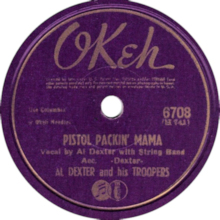| "Pistol Packin' Mama" | ||||
|---|---|---|---|---|
 | ||||
| Single by Al Dexter and His Troopers | ||||
| B-side | "Rosalita" | |||
| Published | June 8, 1943 Edwin H. Morris & Co., Inc.[1] | |||
| Released | March 1943[2][3] | |||
| Recorded | March 20, 1942[4] | |||
| Studio | CBS Columbia Square Studio, Los Angeles | |||
| Genre | Country, honky-tonk | |||
| Length | 2:47 | |||
| Label | Okeh 6708 | |||
| Songwriter(s) | Al Dexter | |||
| Al Dexter and His Troopers singles chronology | ||||
| ||||
| "Pistol Packin' Mama" | ||||
|---|---|---|---|---|
| Single by Bing Crosby and the Andrews Sisters | ||||
| B-side | Vict'ry Polka[6] | |||
| Released | October 21, 1943 | |||
| Recorded | September 27, 1943[7] | |||
| Genre | Country, pop | |||
| Length | 3:01 | |||
| Label | Decca 23277 | |||
| Songwriter(s) | Al Dexter | |||
| Bing Crosby and the Andrews Sisters singles chronology | ||||
| ||||

"Pistol Packin' Mama" was a "Hillbilly"-Honky Tonk record released at the height of World War II that became a nationwide sensation, and the first "Country" song to top the Billboard popular music chart. It was written by Al Dexter of Troup, Texas, who recorded it in Los Angeles, California on March 20, 1942, with top session musicians Dick Roberts, Johnny Bond and Dick Reinhart, who all normally worked for Gene Autry).[4] It was used in the 1943 film Pistol Packin' Mama, starring Ruth Terry and Robert Livingston.
1943 was dominated by a musicians' strike, which since August 1942 had prevented the recording of commercial music by the record companies. As the strike dragged on, the labels began releasing material from their artists' back catalogues, until by mid-1943, that ran out too. Okeh Records released Al Dexter's "Pistol Packin' Mama" (PPM), backed with "Rosalita", in March. It sold quickly, helped by reports in 'The Billboard' magazine, and great popularity in jukeboxes, which had run out of fresh material to play. Although Billboard did not publish its first Folk-Hillbilly chart until January 8, 1944, PPM became the first "Hillbilly" record to reach no. 1 on the National Best Selling Retail Records chart, on October 30, 1943,[8] and spent sixteen weeks in the top 10, on its way to selling 3 million copies.[9][10] It entered the Jukebox chart on July 31, 1943,[11] where it stayed for 28 weeks (the last 14 shared with Bing Crosby version), another unheard of achievement for a "Hillbilly" tune. In Billboard's 1943 Yearbook, released in September, PPM by Dexter was the only hillbilly record to join Glenn Miller and Tommy Dorsey in the best-selling record list.[12]
Top vocalist Bing Crosby, always a major fan of "hillbilly" music,[13] was finally able to record a cover version with the Andrews Sisters on September 27, when his label, Decca, became the first to settle with the union. The single, released October 21, followed Dexter's to the top, revitalizing popularity and sales into 1944. When the first Billboard "Most Played Jukebox Folk Records" chart was published, both PPM versions tied for Number 1, and remained tied for seven straight weeks.[14]
The NBC radio network banned Bing's version because of the line “drinking beer in a cabaret.” The lyrics had to be changed to “singing songs in a cabaret” before it could air.[15][16]
- ^ Library of Congress. Copyright Office. (1943). Catalog of Copyright Entries 1943 2 Music Last Half of 1943 New Series Vol 38 Pts 2-3. United States Copyright Office. U.S. Govt. Print. Off.
- ^ "Talent and Tunes pg 64". google. The Billboard. 22 May 1943. Retrieved 14 July 2021.
- ^ 78 Record: Al Dexter And His Troopers - Pistol Packin' Mama (1943), retrieved 2021-07-30
- ^ a b Russell, Tony (2004). Country Music Records: A Discography, 1921-1942. New York: Oxford University Press. p. 315. ISBN 0195139895.
- ^ "Al Dexter Discography". aldexter.com. Archived from the original on 2012-07-24. Retrieved 14 July 2021.
- ^ "Decca 23277 (10-in. double-faced) - Discography of American Historical Recordings". adp.library.ucsb.edu. Retrieved 2022-06-10.
- ^ "Decca matrix L 3197. Pistol packin' Mama / The Andrews Sisters ; Bing Crosby - Discography of American Historical Recordings". adp.library.ucsb.edu. Retrieved 2022-06-10.
- ^ "The Billboard October 30, 1943 pg 12". google books. 30 October 1943. Retrieved 14 July 2021.
- ^ "Biography". aldexter.com. Archived from the original on 2010-07-08. Retrieved 14 July 2021.
- ^ "Al Dexter". nashvillesongwritersfoundation.com. Retrieved 14 July 2021.
- ^ "The Billboard July 31, 1943 page 94". Google books. 31 July 1943. Retrieved 30 July 2021.
- ^ "The Billboard 1943 Year-Book pg 122". google books. 1943. Retrieved 15 July 2021.
- ^ "Bing Crosby records New San Antonio Rose". Country Music Database. Retrieved 14 July 2021.
- ^ "75 Years Ago, the First Billboard Country Chart Debuted, With 'Pistol Packin' Mama' at No. 1, With a Bullet". Billboard. Retrieved 2021-08-07.
- ^ "Craddock: Al Dexter and a 'Pistol Packin' Mama' | Van Craddock | news-journal.com". 2019-10-06. Archived from the original on 2019-10-06. Retrieved 2021-08-07.
- ^ "Taking off with Pistol Packin' Mama | Music Tales". musictales.club. Retrieved 2021-08-07.
